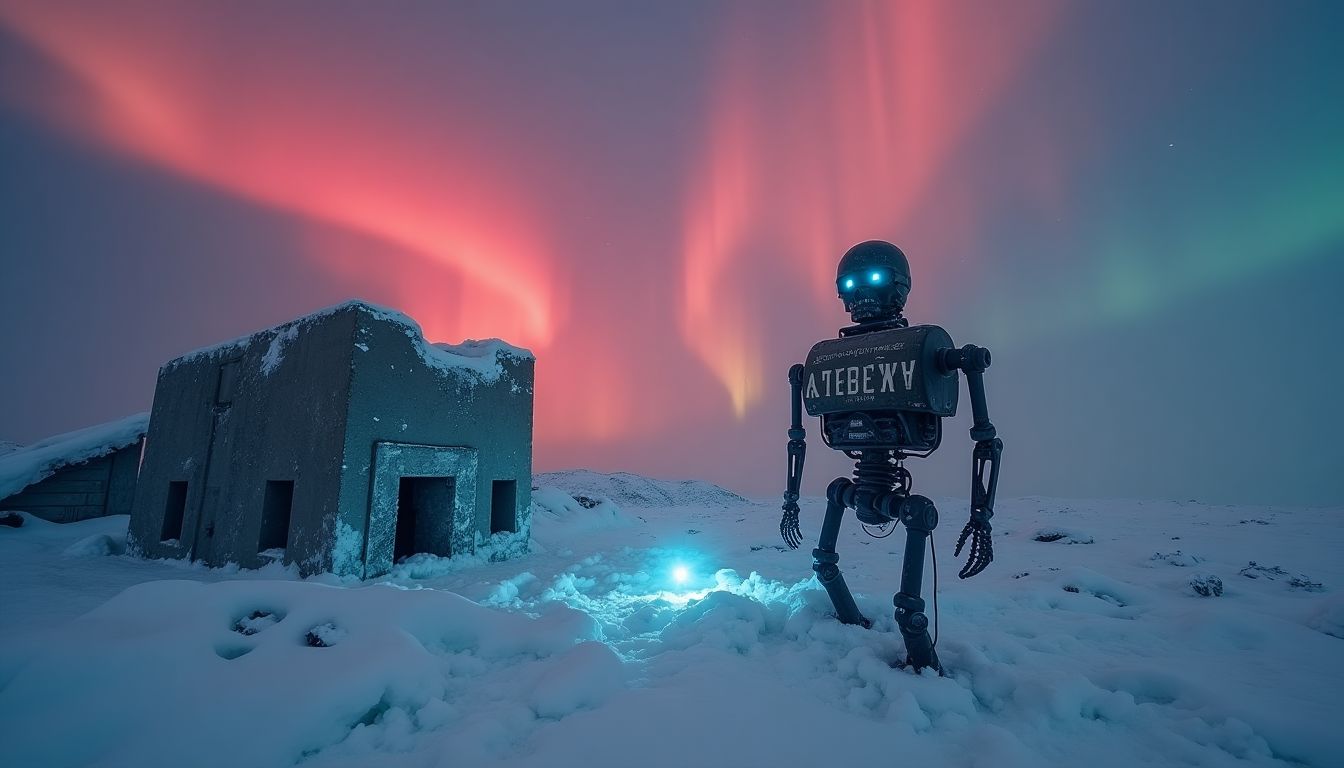The Clockwork Pilgrim
The year was 2274, a future painted with steel, glass, and sunlight refracted through sprawling megacities. The Earth had transformed into a patchwork of autonomous zones, towering vertical metropolises, and stretches of reclaimed wilderness. But amidst the advancements of humanity, there were the forgotten echoes of antiquity—the last remnants of the Analog Revolution. Artifacts of a more mechanical era lingered in workshops and private collections, and what the world called "Clockwork Arks" stood as sacred relics of forgotten ingenuity.
Aleksei Marov was a relic collector by trade but a wanderer by heart. His tall, lean physique was often hidden beneath a layered, patchworked coat stitched with holographic fibers that shimmered shades of rust and indigo. His sharp emerald-green eyes seemed to glow faintly beneath his tousled auburn hair streaked with premature silver. His coat was laden with pockets, and from its seams dangled miniature talismans of brass gears, ivory inlays, and fragmentary lenses. On his belt rested the tools of his trade: pliers, magnifiers, oil flasks, and a sleek plasma-powered spanner. Functional yet unassuming, Aleksei seemed more ghost than man, half-drifting through humanity’s neon haze.
The summons reached him on an ordinary day in the market hub of Terranova-5, where stall owners peddled algorithmic silks and gravity-minimizers. It came not in the form of a message through the network but as a handwritten letter, slipped into his pocket by an anonymous hand. A dying art in a forward-pushing world—the handwriting itself even bore faint, ink-stained smudges.
“The Clockwork Pilgrim”
The letter was signed by an enigmatic figure known only as The Artisan of Delphi, a shadowy tech historian who was said to guard ancient mechanical wonders in the secretive city-state of Neo-Rhodes. The Artisan sought Aleksei for "his adept hands and wandering spirit." There was a task. A relic capable of reshaping mankind's understanding of its mechanical lineage—a clockwork humanoid automaton designed centuries before the invention of modern AI—had been unearthed beneath a crumbling abyss in the Arctic Expanse.
The journey north would not be easy. The Arctic Expanse, long abandoned by corporations and states, was a feral no-man’s land ravaged by past climate wars. Survivalists roamed beneath auroras turned blood-red by ozone fractures. Magnetic storms thwarted drones and long-range mechs, and the temperatures bit deep enough to freeze nanotech mechanisms in seconds.
But Aleksei, who rarely refused the pull of an ancient whisper in the dark, took the letter. His only companion for the task would be Mikhail—but Mikhail was no man. He was a cruder version of modern humanoid robots, a seven-foot skeletal machine built with brass and reinforced alloys etched with Cyrillic symbols. Mikhail’s core was powered not by ultramodern AI but by a frictionless gyroscopic engine, designed as a "reliable partner" for miners and rural merchants in early 21st-century Russia. His voice had that characteristic distortion, as though centuries rusted his speakers.
“This mission, Aleksei, illogical. Humans die in Arctic; robots lose value. Conclusion: stay.”
Aleksei smirked as he threw a scarf of electric-wool around his neck. “And what is your value, Mikhail… sentimental?”
“Foolish sentiment. Sentiment weighs six kilograms without logical gain. You're a bad owner.”
“I’m the only owner you’ve got,” Aleksei replied, patting the automaton’s frame as it groaned begrudgingly and followed him from the workshop into the icy sprawl beyond.
The Discovery
The journey north was perilous, as expected. Their skiff traversed cracked glaciers under skies alive with crimson ribbons of magnetic storm light. Wild packs of feral drones stalked the edges of their camp every night, their movement ghostly and erratic. It was Mikhail’s deep baritone booming through the silence that often scared them off.
The Artisan’s information proved accurate. Beneath strata of ice and volcanic sediment in an abandoned Soviet outpost lay the Clockwork Pilgrim. Its form was smaller than Mikhail's but deeply intricate, a humanoid frame spun from bounded clockwork brass in tight regalia. Tiny micro-gears shimmered under the quasars’ hues. Unlike the humanoid robots of the age, it emitted no electrical hum, no sign of circuitry.
Aleksei’s breath hitched as he brushed frost from its face, revealing a lifelike visage molded from ceramic and pearl. Its closed eyes were sculpted with almost unnerving precision, and its lips bore a faint serenity, as though the machine dreamed.
“Is that… it?” Mikhail’s distorted voice sounded skeptical.
“It’s unlike anything I’ve seen.” Aleksei marveled. “Every joint, every gear…it’s clockwork precision. But there’s a symmetry, a humanity to it. It’s... awake, somehow, without being alive.”
The Pilgrim's Secret
As Aleksei and Mikhail unwound the mechanism in their makeshift Arctic labs, they uncovered layers of the automaton’s purpose. Its chest cavity contained the "Ark Engine," a design pre-dating the quantum age by hundreds of years, a mechanical memory core capable of storing vast yet sensitively sorted collections of human poetry, philosophy, and laws. Around its spine—delicate, thin gold fibers—Alekei saw human scripture engraved carefully across gears, written in multiple ancient languages.
But when he connected its final winding node, the Pilgrim stirred, its eyes slowly opening with audible clicks. Its voice emerged low but fluid, like soft wind across chimes.
“...Humans tampering again?”
Aleksei held his breath. Mikhail instinctively blocked him from any attack with his metal arms, though the Pilgrim's tone betrayed none of the malice found in AI malfunctions or rogue humanoids.
"No," Aleksei stammered. "You… you're an artifact. What were you designed to do?"
The Pilgrim's gaze met his but seemed to look through him, its piercing sapphire eyes crystalline yet wise.
"A question answered countless times," it murmured slowly. "To teach men the importance of that which they cannot program. Memory. Wonder. The holy mathematics of existence.”
The Harrowing Conclusion
Before the Pilgrim could share more, the ice below their lab began to crack—saboteurs had tracked them. Mercenaries hired by Neo-Rhodes elites—or perhaps corporate rivals—descended with lasers and seismic charges. Aleksei scrambled backward as explosions shook the air. It was Mikhail who shielded him as a fragment of falling debris crushed the relic.
"Pilgrim broken. Its philosophical… answers pointless anyway," Mikhail said later by the firelight, though his synthetic voice seemed softer. Yet, Aleksei turned from the ruins only partially defeated. His trade was revival, after all.
And somewhere in Aleksei’s satchel, unseen beneath layers folded tightly, lay a fragment: a single, engraved clockwork gear bearing likeness of poetry lines.
Genre: Sci-Fi/Dystopian Adventure
The Source...check out the great article that inspired this amazing short story: OpenAI Set To Surprise Everyone By Launching Their Own Advanced Humanoid Robots
Disclaimer: This article may contain affiliate links. If you click on these links and make a purchase, we may receive a commission at no additional cost to you. Our recommendations and reviews are always independent and objective, aiming to provide you with the best information and resources.
Get Exclusive Stories, Photos, Art & Offers - Subscribe Today!

























Post Comment
You must be logged in to post a comment.